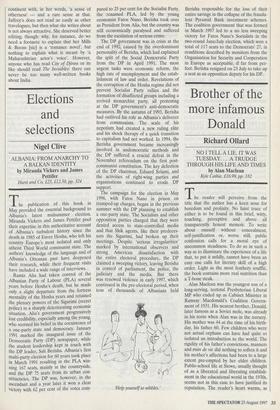Elections and selections
Nigel Clive
ALBANIA: FROM ANARCHY TO A BALKAN IDENTITY by Miranda Vickers and James Pettifer Hurst and Co, £25, £12.50, pp. 324 The publication of this book in May provided the essential background to Albania's latest midsummer election. Miranda Vickers and James Pettifer pool their expertise in this authoritative account of Albania's turbulent history since the death in 1985 of Enver Hoxha, who left his country Europe's most isolated and only atheist Third World communist state. The authors' knowledge of the language and of Albania's Ottoman past have deepened their research, while their frequent visits have included a wide range of interviews. Ramiz Alia had taken control of the Albanian Party of Labour (PLA) several years before Hoxha's death, but he made only a slight departure from the fortress mentality of the Hoxha years and retained the plenary powers of the Sigurimi (secret police) in a sharply deteriorating economic situation. Alia's government progressively lost credibility, especially among the young, who scorned his belief in the coexistence of a one-party state and democracy. January 1991 marked the inaugural issue of the Democratic Party (DP) newspaper, while the student leadership kept in touch with the DP leader, Sali Berisha. Albania's first multi-party election for 60 years took place in March 1991 resulting in the PLA win- ning 167 seats, mainly in the countryside, and the DP 75 seats from its urban con- stituencies. The DP was, however, in the ascendant and a year later it won a clear victory with 62 per cent of the votes corn- pared to 25 per cent for the Socialist Party, the renamed PLA, led by the young economist Fatos Nano. Berisha took over as President from Alia, but the country was still economically paralysed and suffered from the escalation of serious crime.
The, DP government was in crisis at the end of 1992, caused by the overdominant personality of Berisha, which had explained the split of the Social Democratic Party from the DP in April 1991. The most urgent tasks were economic reform, the high rate of unemployment and the estab- lishment of law and order. Revelations of the corruption of the Hoxha regime did not prevent Socialist Party rallies and the formation of disaffected groups including a revived monarchist party, all protesting at the DP government's anti-democratic measures. By the autumn of 1993, Berisha had outlived his role as Albania's deliverer from communism. The scale of his nepotism had created a new ruling elite and his shock therapy of a quick transition to capitalism had not worked. In 1994, the Berisha government became increasingly involved in undemocratic methods and the DP suffered a crucial defeat in the November referendum on the first post- communist constitution. The key defection of the DP chairman, Eduard Selami, and the activities of right-wing parties and organisations continued to erode DP support.
The campaign for the election in May 1996, with Fatos Nano in prison on trumped-up charges, began in the previous summer with the DP planning to establish a one-party state. The Socialists and other opposition parties charged that they were denied access to state-controlled media and that Shik agents, like their predeces- sors the Sigurimi, had broken up their meetings. Despite 'serious irregularities' marked by international observers and strong American dissatisfaction with the entire electoral procedure, the DP claimed a sweeping victory, leaving Berisha in control of parliament, the police, the judiciary and the media. But there was renewed violence in early 1997, which continued in the pre-electoral period, when tens of thousands of Albanians held `Help yourself to nibbles.' Berisha responsible for the loss of their entire savings in the collapse of the fraudu- lent Pyramid Bank investment schemes. The coalition government that was formed in March 1997 led to a no less sweeping victory for Fatos Nano's Socialists in the two-round June/July election, which won a total of 117 seats to the Democrats' 27, in conditions described by monitors from the Organisation for Security and Cooperation in Europe as acceptable, if far from per- fect. Berisha resigned on 23 July to take up a seat as an opposition deputy for his DP.


























































 Previous page
Previous page